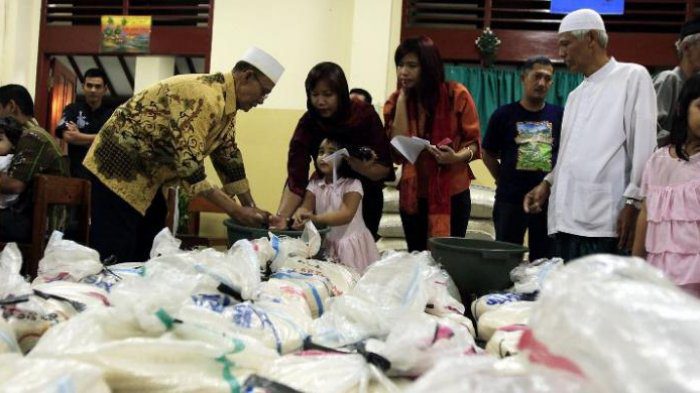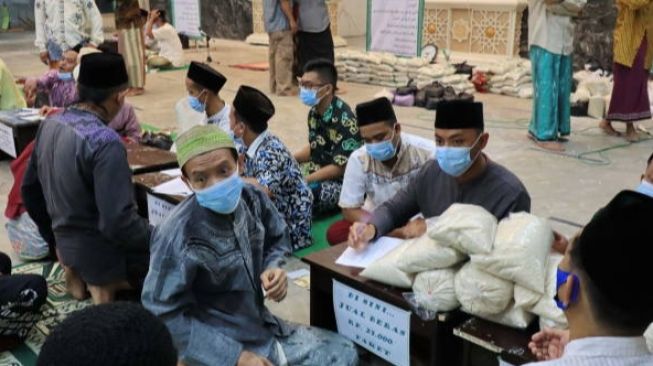Prayer of Zakat Fitrah – When paying zakat fitrah, the person giving zakat or also known as muzakki needs to say a prayer of zakat fitrah. The prayer, as a form of intention, aims to make the worship carried out understandable.
As with other worship services, every worship including paying zakat fitrah is assessed from the intention and sincerity of the executor. Therefore, when performing worship, the intention must be right first and sincere because of Allah. For this reason, when someone is going to carry out zakat fitrah, it is necessary to read a prayer. What is the prayer like when paying zakat fitrah? Listen to the explanation until the end!
Prayer of Intention to Carry out Zakat Fitrah
After learning about zakat fitrah, laws, provisions, muzakki and mustahiq, Sinaumed’s also needs to know about the intentions that need to be said when paying zakat fitrah.
The intention when paying zakat fitrah is divided according to the person paying the zakat fitrah. This is because zakat fitrah may be represented by other family members such as father, mother, husband, wife. This is because everyone has the obligation to pay zakat fitrah, including children and infants.
Because infants and children do not yet understand zakat fitrah, zakat fitrah can also be represented by someone else with the appropriate intention. Here’s an explanation.
1. Prayer for the intention of zakat fitrah when paying zakat for yourself
“Nawaytu an ukhrija zakaata al-fitri ‘an nafsi fardhan lillahi ta’ala.”
Meaning: I intend to issue zakat fitrah, for myself it is fardhu because of Allah Ta’ala.
2. Prayer The intention of zakat fitrah when paying zakat represents family members as well as oneself
“Nawaytu an ukhrija zakaata al-fitri anni wa an jami’i ma yalzimuniy nafaqatuhum syar’an fardhan lillahi ta’ala.”
Meaning: I intend to issue zakat fitrah for myself and for all people whose living has become my fardhu’s responsibility, because of Allah Ta’ala.
3. Prayer The intention of zakat fitrah when paying zakat represents the wife
“Nawaytu an ukhrija zakaata al-fitri ‘an zaujati fardhan lillahi ta’ala.”
Meaning: I intend to issue zakat fitrah for my wife, fardhu because of Allah Ta’ala.
4. Prayer The intention of zakat fitrah when paying zakat represents a son
“Nawaytu an ukhrija zakaata al-fitri ‘an waladi (…..) fardhan lillahi ta’ala.”
Meaning: I intend to issue zakat fitrah for a boy named (mention the name of the boy), fardhu because of Allah Ta’ala.
5. Prayer The intention of zakat fitrah when paying zakat represents girls
“Nawaytu an ukhrija zakaata al-fitri ‘an bint (…..) fardhan lillahi ta’ala.”
Meaning: I intend to issue zakat fitrah for my daughter named (mention the daughter’s name), fardhu because of Allah Ta’ala.
6. The intention of zakat fitrah when paying zakat represents someone else
“Nawaytu an ukhrija zakaata al-fitri ‘an (……) fardhan lillahi ta’ala.”
Meaning: I intend to issue zakat fitrah for (mention the name specifically of the person represented to pay zakat fitrah), fard because of Allah Ta’ala.
That is the intention to pay zakat fitrah, according to the person who will pay or represent the zakat.
Prayer of Zakat Fitrah
Apart from mentioning intentions, Sinaumed’s can also recite a prayer when issuing zakat, this prayer can be recited when issuing zakat fitrah or other zakat. Here’s the prayer.
1. Prayer when issuing zakat fitrah or other zakat
Allahumma-‘alha maghnaman wa la taj’alha maghraman
Meaning: O Allah, make my zakat as a fortune for myself, for the world and the hereafter and do not make my zakat as a fine that can cause anxiety in my heart.
Apart from praying when issuing zakat, for people who receive zakat, be it zakat fitrah or other zakat, there are also prayers that can be recited. Here’s the prayer.
2. Prayer when someone receives zakat
Ajarakallahu fi ma a’thait. Wa ja’alahu laka thahuran. Wa baraka laka fi ma abqait.
Meaning: May Allah reward you for what you give and will make it a suggestion of purification for yourself and give blessings to the treasures that you still have (in yourself).

About Zakat Fitrah
Before knowing about reading the prayer intention for zakat fitrah, it is better if Sinaumed’s knows what zakat fitrah is first. Zakat fitrah is zakat that must be issued by a Muslim before carrying out the Eid prayer. The implementation of zakat fitrah is what makes zakat fitrah different from other zakat.
Zakat fitrah can be interpreted as zakat which is legally obligatory to be paid by a Muslim at the end of the month in the month of Ramadan before the Eid prayer is held. Zakat fitrah can purify the wealth of a Muslim. Because in every property that belongs to someone, there is a little property that belongs to someone else.
Carrying out zakat fitrah, it is obligatory for every Muslim to carry out. Be it a man or a woman, a free person or a slave, a child or an adult.
In general, someone who performs zakat fitrah is required to spend at least 3.5 liters or 2.5 kg of staple food that is usually eaten by muzakki. In a hadith narrated by Abu Daud, it is also explained about zakat fitrah.
‘Whoever pays zakat fitrah before carrying out the Eid prayer, then the zakat fitrah given will be accepted. Whoever pays zakat fitrah after the Eid prayer, then the zakat fitrah that is paid will only be considered as charity among the various types of charity.’ (Narrated by Abu Dawud).
For the quality of the staple food that will be given as zakat fitrah must be in accordance with the quality of the staple food consumed daily by the muzakki.
The Law of Paying Zakat Fitrah
For Muslims, paying zakat fitrah is obligatory for those who can afford it. In a hadith narrated by Imam Bukhari and Muslim, it is explained about the law of paying zakat fitrah.
‘From Ibn Umar said, Rasulullah shallallahu alaihi wa sallam required to pay zakat fitrah as much as one sha of dates or one sha of wheat. Both the zakat is for slaves, free people, men, women or on small children and adults who come from among the Muslims. Rasulullah also ordered to pay zakat before people go out to perform the Eid prayers.’ (Narrated by Bukhari)
In another hadith narrated from Ibn Abbas, the Prophet said,
The Messenger of Allah shallallahu alaihi wa sallam required zakat fitrah, which serves as a cleanser for fasting people from all useless deeds and dirty words and as food for the poor. Whoever performs zakat fitrah before carrying out the Eid prayer, the zakat will be received and whoever performs zakat fitrah after holding the Eid prayer, the zakat given will become ordinary alms’ (HR. Abu Daud, Ad Daruquthni).
From these two hadiths, it is clear that the law of paying zakat fitrah is mandatory and must be carried out before performing the Eid prayer. Because, if you pay zakat fitrah after the Eid prayer, then the zakat will only be considered as ordinary zakat and not zakat fitrah.
Then, how much or what is the provision for muzakki to pay zakat fitrah? In an authentic hadith, it is stated that the condition for someone to pay zakat fitrah is 1 sha of dates or wheat. When converted, then 1 sha is the same as 2.5 kg and when converted to liters, it is equivalent to 3.5 liters. Provisions when paying zakat fitrah, should not be less, and may be increased if able.
In Indonesia itself, the provision for someone to pay zakat fitrah is to use rice or rice. This is because rice or rice is a staple food for zakat givers in Indonesia, so that Muslim communities in Indonesia are required to pay zakat fitrah as much as 2.5 kg of rice before carrying out the Eid prayer.
Who is obliged to issue zakat fitrah every year? According to the provisions, Muslims or people who are Muslim are obliged to issue or pay zakat fitrah every year. The second provision is that the person has the property that he owns for himself and the person he is responsible for one day during the day during the fasting month and at night during Eid al-Fitr. The third provision is a Muslim who lives at the end of Ramadan and at the beginning of the month of Shawwal. Whereas for babies who have just been born on the 1st night of Shawwal, then the baby is not obliged to issue zakat fitrah.
Who is Eligible to Receive Zakat Fitrah?
After knowing the laws, provisions and people who are obliged to pay zakat fitrah, then who is entitled to receive zakat fitrah? If the person who is obliged to pay zakat fitrah is called a muzakki, then the person who has the right to receive zakat fitrah is called a mustahiq.
This mustahiq has been explained in the Quran, namely in the letter At Tawbah verse 60. According to the letter, several criteria are explained for people who are entitled to become mustahiq. Here’s an explanation.
- Poor people
- Poor people
- The administrators of zakat or also called amil
- A convert
- People who become slaves
- People who are in debt
- People who are struggling in the way of Allah in goodness
- People who are traveling long distances, where the journey he is taking is a trip with a good purpose and not for evil purposes.
The eight people have the right to become mustahiq and receive zakat fitrah. Of the eight people, there are also several people who are not allowed to receive zakat fitrah. Anyone?
There are two groups of people who are not allowed to receive zakat fitrah, namely the children and grandchildren of the Prophet Muhammad’s family. Then the second group is the family of the person who gives zakat fitrah, be it grandfather, father, grandson, children, wife or other family members.
Then, how to give the right zakat fitrah? Amil or zakat administrators can come directly and meet mustahiq. Meanwhile, the correct way to pay zakat fitrah is to meet the amil or zakat administrator. Generally, in Indonesia at the end of the month of Ramadan before the Eid al-Fitr prayer, there is an amil or zakat administrator who is at the mosque and is ready to receive zakat fitrah from the muzakki.

The Virtue of Paying Zakat Fitrah
Paying zakat fitrah has many advantages for Muslims, both those who give and receive zakat. Here are some of the virtues of paying zakat fitrah.
1. Forgiven mistakes and sins
It is stated in the Al Maidah verse 12 of the Koran, that for a Muslim who pays zakat fitrah, the mistakes he has made will be forgiven along with his sins.
In addition, Allah also guarantees for every Muslim who establishes prayer and pays zakat, he will enter heaven. The following is the explanation in Surah Al Maidah verse 12.
“And verily Allah took the covenant from the Children of Israel and We appointed them as leaders, Allah also said:
Truly I and you, verily if you establish prayer and pay zakat and give alms to My Apostle, and you help them and you lend good loans to Allah, then verily I will cover your sins. Verily, I will also enter (you) into paradise which has water flowing in the rivers. So, whoever among you disbelieves after that, in fact he has strayed from the straight paths, “(QS. Al Maidah verse 12).
2. The wealth owned by a Muslim will be more blessed
In a hadith narrated by Muslim, it is also stated that the priority when paying zakat is that the property owned will be more blessed.
“Alms or zakat will not reduce one’s wealth.” (HR. Muslim).
This hadith can be interpreted, that even though the assets to be donated are reduced, the remaining assets of a person will be more blessed.
The interpretation of the hadith above was also interpreted by Imam An Nawawi in his book entitled Syarh an Nawawi Muslim style. The following is an explanation of the interpretation.
“In the hadith of the scholars mentioned two sides. The first side is that his wealth will be blessed, kept away by danger and then, his lack of wealth will be covered with vague blessings. This is evident and has been proven by custom. Then the second side is that even though the wealth appears to be reduced because of the zakat, the treasure will have a reward and will cover the lack of wealth and can bring in multiple additions.
3. Removing mistakes
The third priority when a Muslim pays zakat fitrah is being able to erase someone’s mistakes. This third virtue is also listed in an authentic hadith narrated by Tirmidhi.
A Muslim who is willing to pay zakat fitrah and other zakat, then the door of sustenance will be opened for him, and the mistakes he previously made will be eliminated by Allah. Tirmidhi narrates as follows.
“Alms can extinguish mistakes like water can extinguish fire.” (HR. Tirmidhi no 609).
From this hadith, alms or zakat is likened to water which is easily able to extinguish fire, namely mistakes or sins committed by someone.
That is an explanation regarding the intention to carry out zakat fitrah both for oneself, family, wife, son or daughter and the person represented and a little about zakat fitrah.
